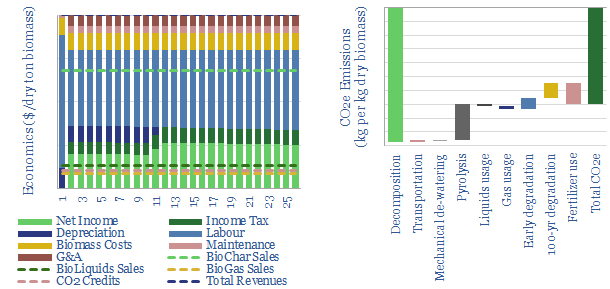Biochar is a miraculous material, improving soils, enhancing agricultural yields and avoiding 1.4kg of net CO2 emissions per kg of waste biomass (that would otherwise have decomposed). IRRs surpass 20% without CO2 prices or policy support. Hence this 18-page note outlines the opportunity, leading companies and a disruption of biofuels?
Biochar is presented as a miracle material by its proponents, improving water and nutrient retention in soils by 20% and crop yields by at least 10%. We review technical papers in support of biochar on pages 2-3.
Biochar pricing varies broadly today, however we argue biochar can earn its keep at a price in the thousands of dollars per ton, based on its agricultural benefits (pages 4-5).
The production process is described in detail on pages 6-8, reviewing different reactor designs, their resultant product mixes, their benefits and their drawbacks.
Economics are laid out on pages 9-10, outlining how IRRs will most likely surpass 20%, on our numbers. Sensitivity analysis shows upside and downside risks.
Carbon credentials are debated on pages 11-12, using detailed carbon accounting principles. Converting each kg of dry biomass into biochar avoids 1.4kg of CO2 emissions.
We are de-risking over 2GTpa of CO2 sequestration, as the biochar market scales up by 2050. There is upside to 6GTpa, if fully de-risked, as discussed on pages 13-14.
Biofuels would be disrupted? We find much greater CO2 abatement is achieved converting biomass into biochar than converting biomass into biofuels. Hence pages 15-16 discuss an emerging competition for feedstocks.
Leading companies are profiled on pages 17-18, including names that stood out for our screening work.
Additional data-files. The economics of biochar production are modeled here. Companies producing biochar are screened here. The related theme of bio-coke is modeled here.
